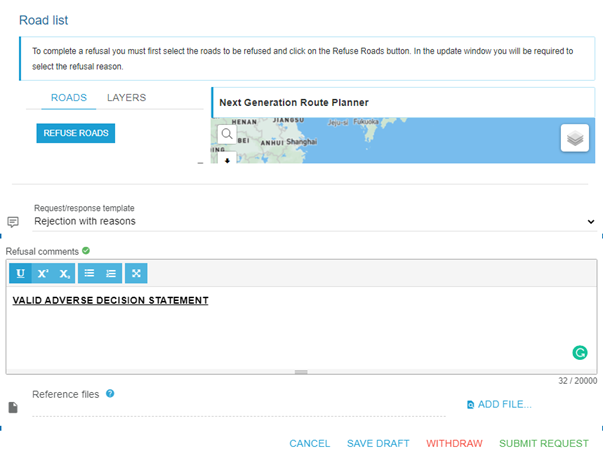As a road manager, it is important to make informed decisions about granting access to heavy vehicles, taking into account the safety of all road users and the potential impact on road infrastructure. While granting access to a heavy vehicle has significant productivity benefits it is equally essential to recognise situations where the potential risks need to be considered by the road manager before granting access to the road network.
What is a valid refusal?
A valid refusal is one that complies with the specific requirements laid out in section 156A of the Heavy Vehicle National Law (HVNL) and relevant guidelines.
For a refusal to be valid, the road manager should be satisfied that proposed movement will, or is likely to -
- cause damage to infrastructure, or
- impose adverse effects on the community, or
- pose a significant risk to public safety.
It should be clear that the identified risk is significant and can’t be mitigated using road or travel conditions.
In addition to meeting these requirements, a valid refusal needs to have adequate reasoning and evidence to support the decision. This includes providing a detailed adverse decision statement that outlines the findings on material facts, the reasoning for the decision, and the evidence or other materials used to make the decision.
What is an invalid refusal?
An invalid refusal is one that does not comply with the HVNL or relevant guidelines. For instance, if the road manager has failed to consider relevant evidence or has relied on insufficient evidence in making a decision, the refusal may be deemed invalid. Similarly, if the adverse decision statement lacks necessary details, it may not be considered a valid refusal.
Another example of an invalid refusal is when the refusal is based on incorrect or irrelevant factors. In such cases, the road manager may need to reassess their decision and provide a more detailed adverse decision statement that outlines the correct reasons for refusal.
What is an adverse decision statement?
When a road manager decides not to grant access or grants access subject to certain conditions, they must provide an adverse decision statement under section 172 of the Heavy Vehicle National Law (HVNL). This statement explains the reasons for the decision, the findings on material facts, and the evidence or other material used in the decision-making process.
The adverse decision statement is crucial in providing transparency and accountability in the decision-making process. It helps ensure that road managers have thoroughly considered the application and have valid reasons for their refusal or imposition of road or travel conditions.
Valid statements help the National Heavy Vehicle Regulator (NHVR) and the applicant to understand the basis of the road manager's decision, which may reduce the number of follow-up queries from both parties. If the statement is unclear or lacks detail, the NHVR may request further explanation or detail to ensure compliance with the HVNL.
When the NHVR deems a refusal invalid
The NHVR may deem a refusal invalid if it is found to be non-compliant with the HVNL requirements. If the NHVR deems a refusal as invalid, it will be sent back to the road manager for review before any decision is accepted. The NHVR does not have the power to reject an adverse decision statement, but it should take reasonable action to ensure all access decisions comply with the HVNL.
Refusals in the NHVR Portal
To ensure compliance with the HVNL, road managers must include adverse decision statements in the NHVR Portal when submitting a refusal. The adverse decision statement should be entered into the "refusal comments" section, located just below the roads list (see image below).

Under the HVNL, reasoning must include detailed information about the findings on material facts, the reasons for the decision, and the evidence or other material on which the findings were made. Selecting 'refusal reasons' from the drop-down box on individual road segments is not equivalent to providing an adverse decision statement.
Advantages of submitting a valid refusal
- Valid refusals save time and money - Providing valid reasoning means the decision can be accepted without further review or administrative burden on road managers. Submitting a valid refusal also reduces the risk of internal reviews and appeals, which can be time-consuming and costly for both the road manager and the applicant. A valid refusal ensures that the NHVR and the applicant have a thorough understanding of the decision and the evidence that led to it.
- Valid refusals help to create an efficient and informed heavy vehicle industry - Submitting a valid refusal helps to build trust and positive relationships between road managers and the heavy vehicle industry. When applicants receive a clear and detailed adverse decision statement, they are more likely to understand the reasons for the decision and accept it as a fair and reasonable outcome. This can lead to better communication and cooperation between road managers and applicants, which can ultimately benefit both parties and improve the overall safety and efficiency of heavy vehicle road access.
- Valid refusals demonstrate compliance with the HVNL - The HVNL requires road managers to make decisions based on public safety, road infrastructure, and the environmental impact of heavy vehicles. Valid refusals provide a clear and detailed explanation of the reasons behind the decision, supported by evidence, and demonstrate to the NHVR transport operators and the wider community that the HVNL is being followed.
To ensure valid decisions, road managers should:
- Familiarise themselves with the legislative requirements outlined in the HVNL.
- Provide a clear and detailed adverse decision statement that outlines the valid reasons for the refusal under the HVNL.
- Make use of available resources to ensure that all necessary information is included in the refusal decision.
The process of submitting a valid refusal may require in depth information, however it will prevent delays in the application process. By working collaboratively with operators, providing clear and detailed reasons for refusals, road managers can promote a culture of safety and efficiency on our roads.
If you're a road manager and need assistance with submitting a valid refusal, contact the NHVR on 13 NHVR (13 64 87) to speak to a Contact Centre representative or send us an email at info@nhvr.gov.au

 Accessibility tools
Accessibility tools

